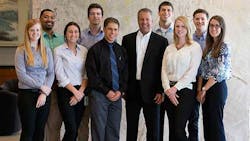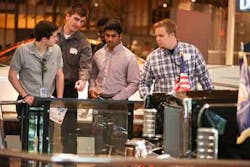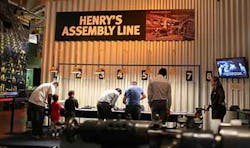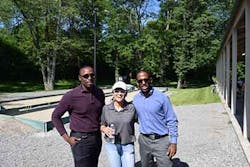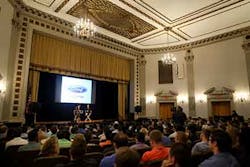On internship recruiting day last year, Carnegie Mellon University engineering major Brian Khoury really got a workout. He not only had a full dance card of interviews; he was on crutches from a knee injury sustained playing defensive end for CMU’s football team. His mom flew out from Davenport, Iowa, to help him hobble up and down stairs to meetings with Apple, Rockwell Automation, NewCor, Texas Instruments and Ford.
Khoury, who was involved in a student engineering team that built a solar-powered canoe and raced it overseas, liked the family vibe he got from Ford during the meet-and-greets. “People were very positive and encouraging,” he recalls. “If there was a way they could help you out, they would.” Plus, although the tech companies had a certain “glitz and glamor appeal,” he wanted to work on something mechanical, to “make more than apps that go on people’s phones.”Laura Kurtz, manager of U.S. recruiting for Ford, says that a few years ago Ford had to reevaluate its recruitment strategy to attract students like Khoury. “We realized we’re not just competing against recruiting from other manufacturers—we’re competing against technology and pharmaceutical companies. So we have to help students understand that our manufacturing facilities are high-tech, clean, with a lot of robotics and sophisticated equipment. We also have to tell students that you can get the same type of experience as you do with a tech company because there’s so many computers in our cars.”
To attract more high-caliber students, says Kurtz, Ford has increased its on-campus presence at the 50 or so colleges where it focuses its efforts. Schools with large, diverse engineering programs--like Ohio State University, MIT and UC Berkley—top the list.Ratcheting up the Recruitment Numbers
Ford recruited 571 interns for its 2015 class; the 2016 class is expected to have 650. “We look at interns as the primary feeder group for the Ford College Graduate program,” says Kurtz, referring to the multi-year program that’s the automotive version of a medical residency. New hires round to different departments and gain a better understanding of company culture, as well as what goes into building a vehicle.
For instance, FCGs in product development might start by spending a month working at an assembly plant. “And they actually work on the assembly line as an hourly employee to understand how a vehicle is built,” says Kurtz. Next, they get their first assignments, generally in a subcomponent area of product development—like, say, chassis engineering, where they learn how a chassis is assembled and what the components are.
They then receive a second assignment in another area of engineering—design, perhaps, or a rotation where they work with suppliers so they can better understand the supplier community.
The most in-demand recruits are in product development, manufacturing engineering, IT and safety and sustainability engineering. Seventy-three percent of new hires are headed for technical positions.Most interns have finished their junior year or the first year of a graduate program, but “we are also starting to hire or recruit technical interns at the sophomore level because we realize in order to build that relationship with the students, we need to start earlier in their career,” says Kurtz.
Over the last couple of years, 68% of Ford interns have been hired on as FSGs, says Kurtz. Intern supervisors spend the summer evaluating the students to determine whether they will receive offers. “That’s one of our goals,” says Kurtz. “The second goal is to provide a great learning experience for students, where they can apply the knowledge from the classroom into the workplace.”
Each intern receives an individualized work plan that defines what the objectives are for the summer, what the student will work on during the internship and what he or she can learn from the assignment. “It’s really structured with the student in mind, so they have a clear road map when they start at Ford of what they need to focus on and what they’re going to be accomplishing,” says Kurtz.
Intern supervisors meet with the students on a regular basis and give feedback. Formal performance reviews are done mid-term and at the internship’s end.
Each student is also required to give a management presentation “about themselves, what they learned over the summer, and about Ford,” says Kurtz. “It’s a great developmental opportunity for an intern to get in front of five to eight Ford managers and talk about their experiences. And it gives us a good lens into what the student learned and their ability as a potential Ford employee.”Most interns work in Dearborn, though a small percentage are at other plant sites. Each student is assigned a mentor—a Ford manager—and a “buddy”—a Ford College Graduate who can help with the day-to-day stuff like figuring out where to park and how to get around their department. Social events include Detroit Tigers games, a Ride and Drive experience on Ford’s Dearborn Test track and a town hall event with CEO Mark Fields where students are free to ask questions.
Though he got an offer from another company on recruiting day, Khoury settled on the Ford internship, which involved working with suppliers in the engineering group of purchasing. A tech talk by Hau Thai-Tang, a Carnegie Mellon Alum and Ford’s group vice president of global purchasing “made a strong impression.” Thai-Tang, trained as an engineer, emphasized in his speech that he had a succession of jobs that allowed him to delve into his interests--designing the new Mustang, traveling around with the Cannonball 300 race team and eventually getting involved with purchasing.
“More than anything, there was a lot of cross-functionality at Ford,” observes Khoury. He also liked the company’s culture, emphasizing relationships, working together and ethical behavior. “People were very positive and encouraging. If there was a way they could help you out, they would help you out.” Plus, they were nice to his mom. “She was really happy I got an offer from them.”
About the Author

Laura Putre
Senior Editor, IndustryWeek
As senior editor, Laura Putre works with IndustryWeek's editorial contributors and reports on leadership and the automotive industry as they relate to manufacturing. She joined IndustryWeek in 2015 as a staff writer covering workforce issues.
Prior to IndustryWeek, Laura reported on the healthcare industry and covered local news. She was the editor of the Chicago Journal and a staff writer for Cleveland Scene. Her national bylines include The Guardian, Slate, Pacific-Standard and The Root.
Laura was a National Press Foundation fellow in 2022.
Got a story idea? Reach out to Laura at [email protected]
